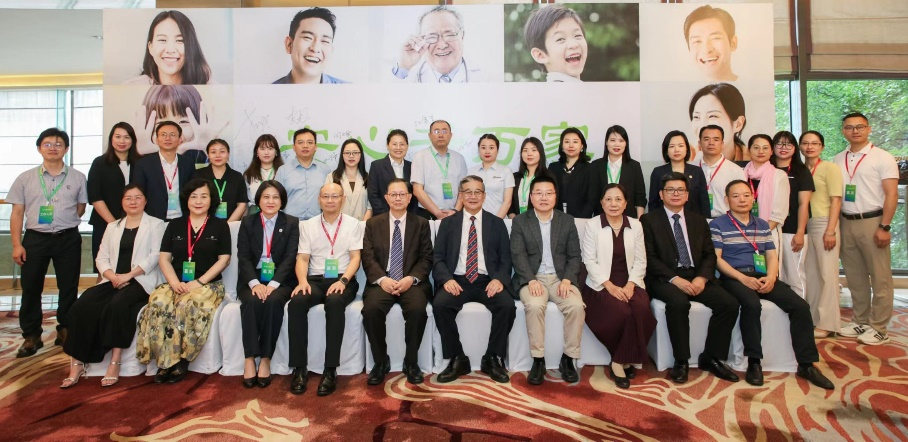
CreativeBio Major Announcement: Over 830,000 Real-World Application Test Cases of Colosafe® Released
Colosafe® | Creative Biosciences | 2024.05.27
On May 26, the fourth annual "Colon Health Day for Peace of Mind in Millions of Families" was celebrated. At this significant event, Creative Biosciences (Guangzhou) CO., Ltd (CreativeBio), a leading domestic cancer detection company, announced the latest real-world application testing data for their product, Colosafe®. As of April 30, 2024, Colosafe® has achieved over 830,000 real-world application test cases!

Group photo of the attending guests
The attendees who gave speeches at the meeting included Professor Wang Jianping, Honorary President of the Sixth Affiliated Hospital of Sun Yat-sen University; Professor Lan Ping, Head of the Department of Colorectal Surgery at the Sixth Affiliated Hospital of Sun Yat-sen University; Professor Hongzhi Zou, Founder of Creative Biosciences; Professor Zou Weimin, former Director of Guangdong Provincial People's Hospital/Provincial Clinical Testing Quality Control Center; Professor Zou Gangming, Editor-in-Chief of the American Journal of Translational Medicine; Ms. Liu Yanmin, Director of Gastroenterology at Guangzhou Development Zone Hospital; Professor Yang Xiaocui, President of Ankang City Digestive Disease Hospital; and Ms. Deng Xiaoqin, Chief Marketing Officer of CreativeBio. The meeting was hosted by Dr. Zhao Jin, Vice President of Public Health at CreativeBio.

Professor Wang Jianping
Honorary President of the Sixth Affiliated Hospital of Sun Yat-sen University
Professor Wang Jianping delivered a speech highlighting the significant impact of government-led and community-supported large-scale colorectal cancer screening programs. He emphasized that these initiatives can greatly enhance screening effectiveness and benefit a broader population. He also noted the promising future of fecal DNA testing for colorectal cancer, praising its ease of use and high accuracy, and encouraged relevant departments and institutions to explore this technology further.
This testing technology complements colonoscopy well by offering benefits of being painless, non-invasive, yielding a high acceptance rate particularly for the early detection of colorectal cancer in the elderly population and postoperative monitoring.

Dr. Hongzhi Zou
Founder of CreativeBio
Dr. Hongzhi Zou stated in his address that in recent years, CreativeBio has implemented multiple large-scale colorectal cancer screening projects in places like Huangpu and Zengcheng District in Guangzhou, as well as Shipai Town in Dongguan. These initiatives have demonstrated high-level technical expertise and quality implementation strategies. Additionally, through continuous efforts in promoting research progress, CreativeBio has collaborated with authoritative medical institutions in China to conduct nationwide community-based colorectal cancer screening programs.
These large-scale screening projects have been highly effective, with over 70% compliance for colonoscopy among positive participants and colorectal neoplasia detection rate exceeding 80%. These efforts have contributed significantly to reducing the incidence and mortality rates of colorectal cancer in China.
Currently, CreativeBio has begun its global expansion by establishing subsidiaries in the United States, Germany, and Hong Kong, vigorously expanding its international business to provide Chinese innovations to the global market.

Professor Lan Ping
Head of the Department of Colorectal Surgery at the Sixth Affiliated Hospital of Sun Yat-sen University
During the conference, Professor Lan Ping discussed the current state of diagnosis and comprehensive monitoring for early rectal cancer. He noted that the epidemiological characteristics of colorectal cancer (CRC) in China differ from those in other countries, with rectal cancer accounting for about 60% of CRC cases in China, and mid-low rectal cancer constituting 60-70% of these cases.
Currently, research on early rectal cancer is limited, primarily focusing on T1 stage rectal cancer due to the potential for local treatment. The diagnosis and treatment options for T1 stage rectal cancer are more complex and require special attention. Ensuring organ function and improving quality of life while maintaining the curative effect of cancer treatment is crucial, necessitating the development of individualized treatment strategies for precise diagnosis and treatment.
A study by the Sixth Affiliated Hospital of Sun Yat-sen University on lymph node metastasis in T1 colorectal cancer found that the preoperative endoscopic tumor morphology, vascular invasion, and patient gender are also risk factors for lymph node metastasis. Among these, gender only affects lymph node metastasis in early-onset colorectal cancer patients. In response to this, a new assessment system was established, which can effectively reduce the rate of salvage radical surgeries by 48.9%[1].

Professor Zou Weimin
Former Director of Guangdong Provincial People's Hospital/Provincial Clinical Testing Quality Control Center
Professor Zou Weimin stated at the conference that molecular diagnostic technology will lead the future of testing. He highlighted that in the field of early screening and diagnosis of tumors, molecular diagnostic technology not only significantly enhances the sensitivity and specificity of tests, greatly reducing false positives, but also provides robust technical support for large-scale rapid screening and personalized treatment.
Using molecular diagnostic technology, abnormal methylated genes can be detected in the colonic tissues of high-risk colorectal cancer populations, indicating that abnormal DNA methylation may be one of the earliest molecular events initiating the colorectal cancer process[2]. Furthermore, abnormal methylation markers can also be detected in stool and blood samples[3]. Therefore, detecting abnormal DNA methylation in stool can effectively assess the status of colorectal cancer.

Professor Zou Gangming
Editor-in-Chief of the American Journal of Translational Medicine
At the conference, Professor Zou Gangming introduced the screening model and advancements for colorectal cancer in the United States. He mentioned that African American actor Chadwick Boseman, the star of Marvel's "Black Panther," died from colorectal cancer at the young age of 43. According to the latest data from 2024, colorectal cancer has become the second leading cause of cancer-related death in the United States, with more than 54,600 deaths annually.
Several screening guidelines, such as those from the National Comprehensive Cancer Network (NCCN) and the U.S. Multi-Society Task Force on Colorectal Cancer (USMSTF), recommend that average-risk individuals of appropriate age undergo regular high-sensitivity fecal DNA testing or colonoscopy. All positive non-colonoscopy screening results should promptly follow-up with colonoscopy.
He mentioned that under the Affordable Care Act (ACA) in the United States, private insurance companies and Medicare are required to cover the cost of colorectal cancer screening test. Patients should not incur any out-of-pocket expenses such as copayments or deductibles for these screenings.

Ms. Liu Yanmin
Director of the Gastroenterology Department at Guangzhou Development District Hospital
At the conference, Director Liu Yanmin shared her practical experiences with large-scale community colorectal cancer screening. She introduced the free community screening program for colorectal cancer in Huangpu District, which started in September 2023 and utilized fecal DNA testing. Last year, the program screened a total of 7,505 community residents. Guangzhou Development District Hospital, one of the designated hospitals for the project, collaborated with community workers, grid members, volunteers, and other groups. They used WeChat groups, phone calls, and door-to-door visits for promotion. Within two months, they quickly completed the annual initial screening and colonoscopy examinations for residents who tested positive.
The compliance rate for colonoscopy among residents who tested positive was as high as 74%, with detection rate of colorectal neoplasia over 80%. Compared to traditional screening methods, fecal DNA testing is more accurate, reducing false positives and avoiding more than half of unnecessary colonoscopy examinations. It has been highly accepted by residents and recommended for widespread community screening.

Professor Yang Xiaocui
President of Ankang City Digestive Disease Hospital
At the conference, Professor Yang Xiaocui shared the Ankang model for early diagnosis and treatment of gastrointestinal neoplasia. She stated that Ankang Central Hospital participated in the " Community Colorectal Cancer Screening for Ten Thousand Population" led by Shanghai Changhai Hospital and jointly conducted by 14 hospitals and dozens of communities nationwide.
During the pandemic, resident participation was low, and the project faced significant challenges. In response, the hospital launched a theme initiative partnering with community health service centers and other organizations such as the Science Association to establish an alliance. Together, they organized a series of activities integrating science education and screening. For residents who tested positive in the screening, the hospital provided a free green channel service for colonoscopy follow-up, achieving very good outcomes.

Ms. Deng Xiaoqin
Chief Marketing Officer of CreativeBio
At the end of the conference, Ms. Deng Xiaoqin officially released the "2024 Real-world Application Testing Data of Colosafe®”. This data, derived from Creativebio testing laboratories, partner hospitals, and other partner institutions, shows the outstanding fulfillments listed below.
As of April 30, 2024, a total of 836,797 Colosafe® tests were completed with trackable cases of 571,372 among which 37,267 were positive (a positivity rate of 6.52%).
All positive participants were recommended for colonoscopy follow-ups. Only 15,791 individuals of positive cases underwent colonoscopy (compliance rate of 42.37%) and 11,128 requiring treatments were identified, including 1,965 cases of colorectal cancer, 4,851 of adenomas, and 4,312 of polyps. Colosafe® demonstrated a positive predictive value (PPV) for colorectal cancer of 12.44% and for colorectal neoplasm of 70.47%, indicating excellent testing performance.
Additionally, from the trackable colonoscopy and pathology results of 11,422 Colosafe® positive tests, it was found that while the Ct value ≤ 31, the positive predictive value (PPV) for colorectal neoplasm was 99%, with approximately 91% of these individuals having colorectal cancer. While 31 < Ct value ≤ 34, the PPV for colorectal neoplasm was 92%, with about 60% of these individuals having colorectal cancer. While 34 < Ct value ≤ 38, about 58% of these individuals had adenomas or polyps.
The famous Chinese educator Yan Yangchu once advised that those committed to the welfare of the people need to maintain the mind of a scientist and the heart of a missionary. Ms. Deng declared that CreativeBio will strive to provide excellent product service, help more people with early detection, prevention, and diagnosis to stay away from colorectal cancer, thus bringing peace of mind to millions of families.
[1]Wang K, He H, Lin Y, Zhang Y, Chen J, Hu J, He X. A new clinical model for predicting lymph node metastasis in T1 colorectal cancer. Int J Colorectal Dis. 2024 Apr 3;39(1):46
[2]方琦雯,黄鑫鑫,王智杰,等. DNA甲基化在结直肠癌及癌前病变早期诊断中的研究进展[J]. 中华消化内镜杂志,2023,40(7):575-580. DOI:10.3760/cma.j.cn321463-20220725-00304.
[3]Anghel SA, Ioniță-Mîndrican CB, Luca I, Pop AL. Promising Epigenetic Biomarkers for the Early Detection of Colorectal Cancer: A Systematic Review. Cancers (Basel). 2021 Oct 2;13(19):4965. doi: 10.3390/cancers13194965. PMID: 34638449; PMCID: PMC8508438.

